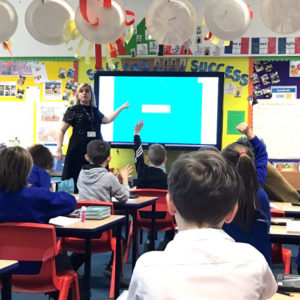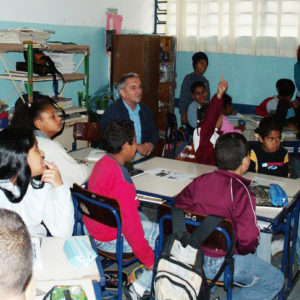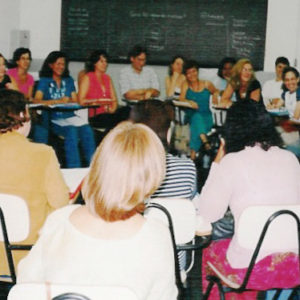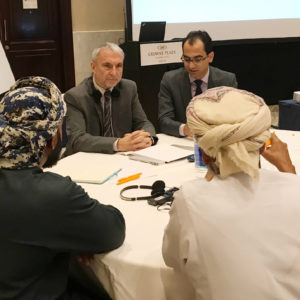PROMOTING EQUITY
IN EDUCATION
Home / Inclusive Schooling / Promoting Equity in Education
A SET OF RESEARCH-BASED PROFESSIONAL DEVELOPMENT MATERIALS
MEL AINSCOW
These professional development materials focus on the greatest challenge facing education systems around the world, that of finding ways of ensuring the progress of all children in all schools. In economically poorer countries this is about the millions of children with little or no access to formal education. Meanwhile, in wealthier countries many young people leave school with no worthwhile qualifications, whilst others are placed in provision away from mainstream classrooms and some choose to drop out since the lessons seem irrelevant to their lives.
Drawing on Mel Ainscow’s extensive international experience as a researcher and consultant, the aim of the materials is to support practitioners in addressing this challenge. More specifically, they provide a stimulus for professional development sessions, which can be used live or online – within schools or elsewhere. The central message is: ‘Equity is the key to achieving excellence’.
The materials consist of six units. Each of these has a 15-minute video presentation that can be used individually, or in combination, to stimulate reflection, debate and experimentation. The units also have short, written think-pieces that summarise relevant research and make suggestions for further reading. In addition, review questions to stimulate thinking and provide a focus for group discussions are provided.
In summary, the six units are as follows:
UNIT 1: CONCEPTS AND FRAMEWORKS

This introductory unit outlines the focus and scope of the ideas included in the materials. These are explained with reference to global developments that are driven by the principle of equity in educational settings. This is seen as involving a concern with inclusion and fairness for all learners. A recent UNESCO report sums this up as follows: ‘Every learner matters and matters equally’. Lessons from schools and education systems in the UK and internationally that have made progress in relation to equity are presented. These are discussed in relation to the ‘ecology of equity’, a framework for reviewing and developing inclusive educational contexts.
UNIT 2: DEVELOPING INCLUSIVE CLASSROOM PRACTICES

Building on the premise that ‘schools know more than they use’, this unit looks at forms of professional learning that can facilitate changes in thinking and practice. Emphasis is placed on inquiry-based approaches in which teachers collaborate in exploring how lessons can include all learners. It is argued that the study of teaching within a school through an active engagement with evidence of various kinds can help in generating a ‘language of practice’. Particularly powerful techniques for generating evidence involve the use of mutual lesson observation, and comments collected from students about teaching and learning within a school. Examples are provided to illustrate the impact of such processes on the quality of teaching and the progress of learners.
UNIT 3: TOWARDS SCHOOLS FOR ALL

This unit is based on the idea that there is not one single model of an inclusive school. What is common to highly inclusive schools is that they are welcoming and supportive places for all of their students, not least for those with disabilities and others who experience difficulties with learning or in socialising. Research shows the potential of approaches that encourage cooperation within a school in ways that create conditions that maximise participation, whilst at the same time achieving high standards of learning. The unit outlines how the introduction of such ways of working can help foster a more inclusive culture within a school, together with examining the role of school leadership in making this happen.
UNIT 4: SCHOOL-TO-SCHOOL COOPERATION

There is evidence that school-to-school collaboration can strengthen the capacity of individual organisations to respond to learner diversity. Specifically, collaboration between schools can help to reduce the polarisation of schools, to the particular benefit of those students who are at the edges of the system and therefore marginalised. It is important to realise, however, that developing partnerships between schools is not a straightforward process. All too often, partnership arrangements can lead to meetings without any significant action. This unit uses practical examples to point to the steps that are needed in order to make school cooperation effective.
UNIT 5: WORKING WITH THE COMMUNITY

There is encouraging research evidence showing the positive impacts on learners when what schools do is aligned in a coherent strategy with the efforts of other community players – families, employers, community groups, colleges, universities and public sector services. This unit explains research which suggests that the success of such partnership working is dependent upon a common understanding of what those involved are trying to achieve and an engagement with various forms of evidence to stimulate collective effort. It is argued that schools have to develop patterns of working that enable them to become flexible in interacting and collaborating with those in their wider communities who have an impact on the lives of children and young people.
UNIT 6: SYSTEM-LEVEL CHANGE

There is encouraging research evidence showing the positive impacts on learners when what schools do is aligned in a coherent strategy with the efforts of other community players – families, employers, community groups, colleges, universities and public sector services. This unit explains research which suggests that the success of such partnership working is dependent upon a common understanding of what those involved are trying to achieve and an engagement with various forms of evidence to stimulate collective effort. It is argued that schools have to develop patterns of working that enable them to become flexible in interacting and collaborating with those in their wider communities who have an impact on the lives of children and young people.
Mel Ainscow is Professor of Education at University of Glasgow, Emeritus Professor at the University of Manchester and Adjunct Professor at Queensland University of Technology. A long-term consultant to UNESCO, he is currently working on international efforts to promote equity globally. Between 2007 and 2011 he led the Greater Manchester Challenge a project that involved a partnership between national government, ten local authorities, 1,150 schools and many other stakeholders, and had a government investment of around £50 million. He went on to lead Schools Challenge Cymru, the Welsh Government’s multi-million pounds flagship programme to accelerate the rate of improvement across the country’s schools.
Mel is currently chair of the Greater Manchester Education & Employment Board. His most recent books are: ‘Struggles for equity in education: the selected works of Mel Ainscow’ (World Library of Educationalists series); ‘Inside the autonomous school: making sense of a global educational trend’ (with Maija Salokangas); and ‘Changing education systems: a research-based approach’ (with Chris Chapman and Mark Hadfield), all published by Routledge.
In the Queen’s 2012 New Year Honours list he was made a CBE for services to education.